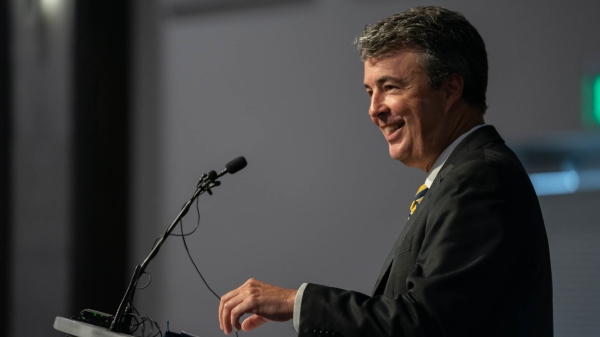UPDATE at 8:15 p.m.: Federal Judge Myron Thompson issued a temporary restraining order Monday night, barring the state of Alabama from prohibiting abortions during the novel coronavirus outbreak. The temporary restraining order comes after abortion clinics and the ACLU sued the state, alleging that the statewide business closures ordered last week wrongfully and illegally prohibited abortions.
The American Civil Liberties Union and the ACLU of Alabama on Monday filed a court document arguing that Alabama is restricting access to abortions under the guise of protecting the public from COVID-19.
Without a court injunction before 8 p.m. on Monday the groups tell the court in the filing that more than 20 abortions in Alabama will have to be canceled this week, including one for a woman “who will be pushed past the legal limit for abortion in Alabama if she does not obtain an abortion this week.”
Both groups filed a supplemental complaint in the U.S. District Court for the Middle District of Alabama that argues Alabama state health officer Dr. Scott Harris’s March 27 public health order effectively bans abortions in Alabama, despite the court’s previous ruling blocking the state’s near-total ban on abortions.
“On March 19 and 20, in response to the COVID-19 crisis, the State Public Health Officer issued a series of emergency orders restricting ‘elective’ medical procedures in an effort to enforce ‘social distancing,’” the court filing states. “At the time, counsel for the Alabama Department of Public Health … assured counsel for the Plaintiffs that the Department did not intend to enforce the orders against abortion clinics, which provide essential, time-sensitive medical care.”
But Harris’s March 27 order prohibits any medical or surgical procedure except those necessary to treat an “emergency medical condition” or to “avoid serious harm from an underlying condition.”
“The Attorney General has taken the position that the March 27 Order prohibits some unknown quantity of pre-viability abortions,” the court filing reads. “Because Plaintiffs cannot risk criminal, along with licensure penalties, for continuing to perform abortions under these circumstances, they have had to stop performing pre-viability abortions. As such, the recent actions of the Attorney General and ADPH have effectively nullified the relief this Court granted in its preliminary injunction ruling.”
In emails attached as exhibits to the supplemental complaint, Randall Marshall, executive director of the ACLU of Alabama, sought clarification from the attorney general’s office as to whether the March 27 order banned all or some types of abortions, whether through medication or surgery.
“Per the order, we are unable to provide you with a blanket affirmation that abortions will, in every case, fall within one of the exemptions,” wrote Katherine Robertson, chief counsel in the Alabama Attorney General’s office in response to Randall Marshall at the ACLU of Alabama’s request for clarification.
Jennifer Dalven, the director of the Reproductive Freedom Project at ACLU, in a response to APR’s question, said in a call with reporters Monday that the Alabama Attorney General’s office’s vague response is troubling.
“This law, or this action, threatens doctors with criminal penalties just for providing essential health care to their patients,” Dalven said. “And the refusal of the Attorney General and the Department of Health to provide any clarity about what they think doctors are allowed to do, and what they’re not allowed to do puts doctors in a terrible position of being forced to risk their licenses and risk prosecution if they provide this care.”
“Government response to the spread of COVID-19 must be grounded in science and public health, not politics,” said Alexa Kolbi-Molinas, senior attorney at the ACLU Reproductive Freedom Project, in a statement. “As leading medical experts have recognized, abortion is essential, time-sensitive health care. Alabama’s attempts to prevent patients from accessing abortion care does nothing to slow the spread of COVID-19, it just stops people from getting this essential care.”
“Abortion providers take seriously their responsibility to protect the health and safety of their patients, the staff, and their community,” the executive director of the ACLU of Alabama said in a statement. “But pregnant people need health care whether it’s prenatal care and childbirth services or abortion care. Preventing them from getting an abortion doesn’t do anything to stop the COVID-19 virus, it just takes the decision whether to have a child out of their hands.”
Candace O’Brien, healthcare services programs manager for the Yellowhammer Fund, an Alabama nonprofit that supports and advocates for access to abortion, in a statement Monday called for Alabama to end the ban on abortions during the COVID-19 outbreak.
“Unlike truly elective medical procedures, abortion is performed in stand-alone clinics, reducing the likelihood of patient exposure to and transmission of COVID-19, which cannot be said about surgeries in hospitals or visits to a community medical clinic,” O’Brien said in a statement. “Finally, abortion actually reduces long-term need for medical care that will be required for prenatal and post-partum office visits as well as the resources a hospital labor and birth require. Abortion is quite literally healthcare in this sense – essential healthcare that cannot be delayed or ignored. For any person facing an unwanted pregnancy, especially now that we are in a worldwide pandemic, abortion needs to be even more accessible.”
Alabama Attorney General Steve Marshall responded to ACLU’s court filing on Monday, and in a statement said, “Put simply, no provider or clinic is excused from compliance with this order.”
Marshall on Monday also joined 14 other Republican attorneys generals attorneys in a court filing supporting the states of Ohio and Texas as both states are involved in similar lawsuits over abortion bans related to the COVID-19 outbreak.
Federal judges in both Ohio and Texas issued restraining orders Monday evening lifting restrictions on access to abortions.





















































